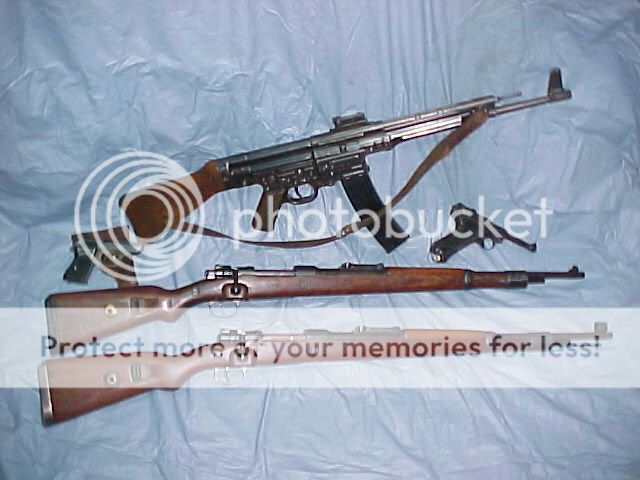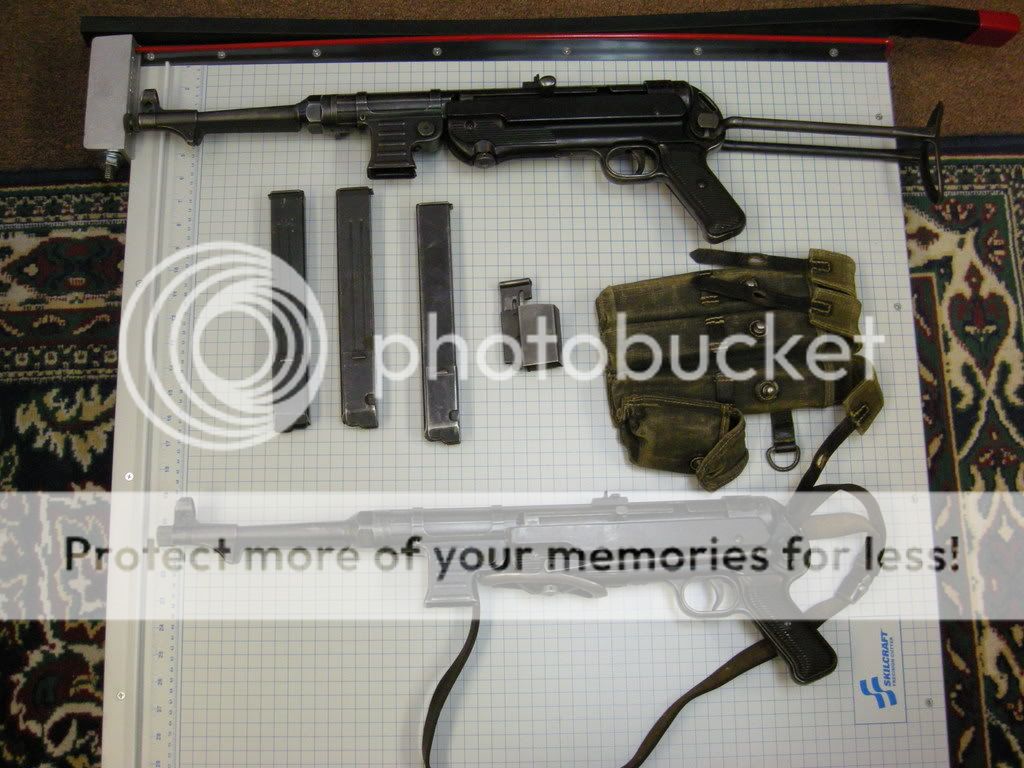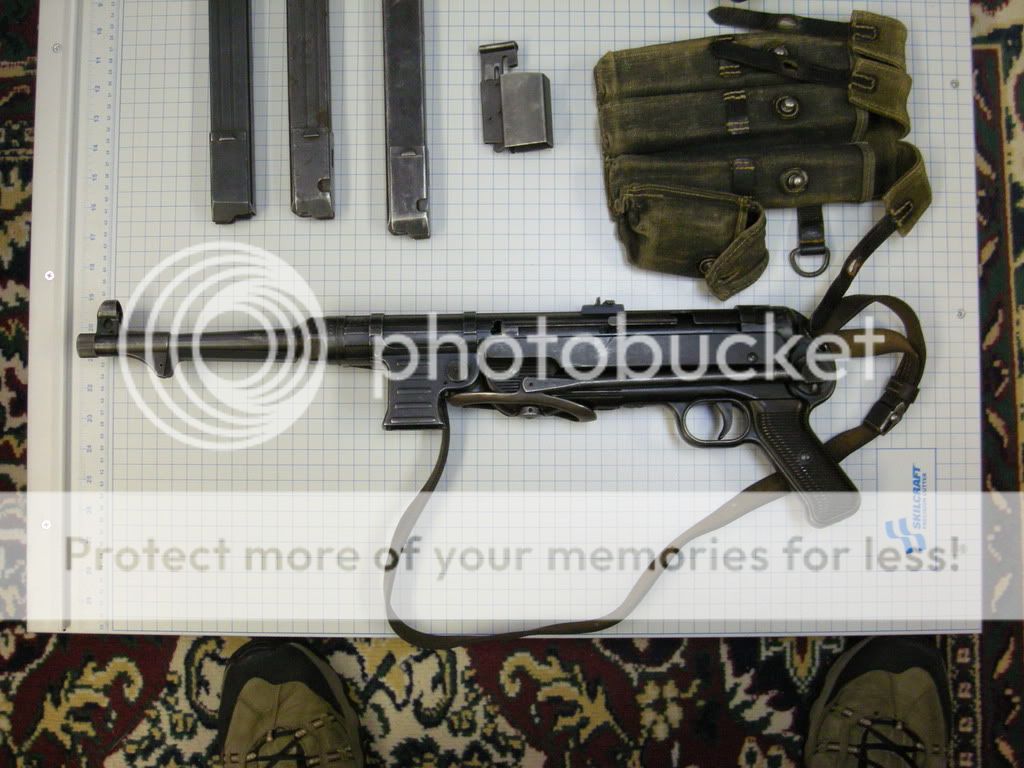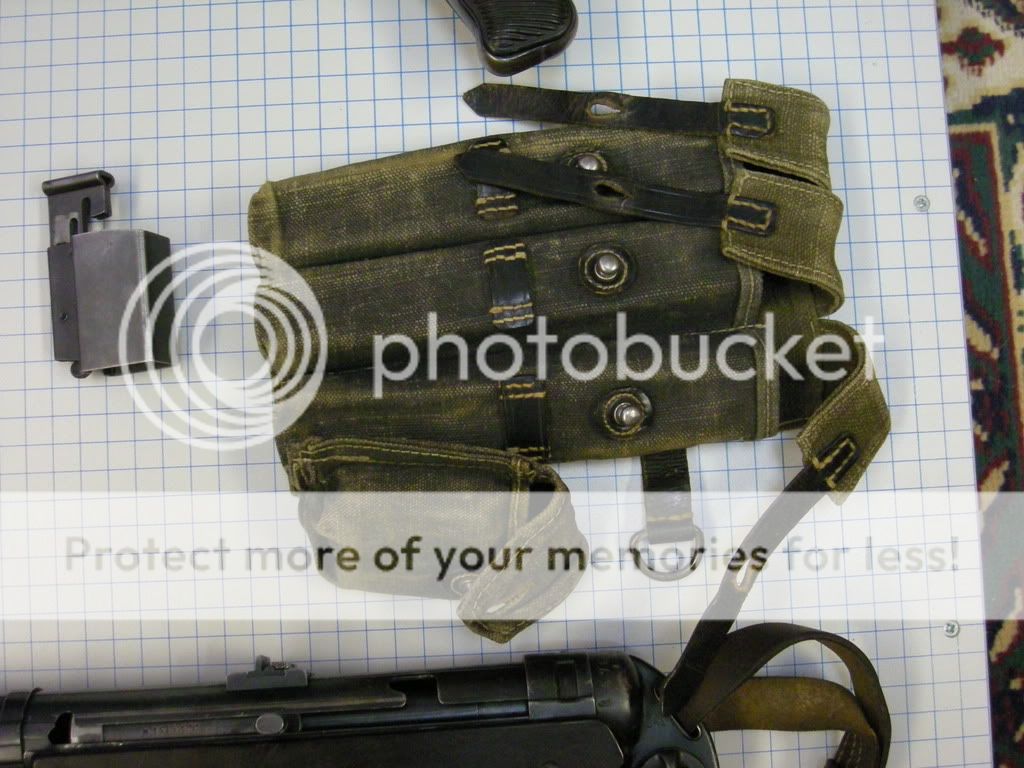-
If you enjoy the forum please consider supporting it by signing up for a NES Membership The benefits pay for the membership many times over.
You are using an out of date browser. It may not display this or other websites correctly.
You should upgrade or use an alternative browser.
You should upgrade or use an alternative browser.
class III tragedy
- Thread starter nickortizzle1035
- Start date
Seriously. It's not worth it. The Feds would be the least of your worries:
its not worth it at all. i cant even imagine how anyone would consider having a illegal machine gun in their hosue considering the life ending penalties that will emerge if your caught with one.
ive only seen 2 or 3 StG 44s ever, and seeing them was enough for me. i dont need to hide one in my house and take the risk of getting locked up for hiding a weapon that some consider rare, which is odd becuse 400,000+ of them were made...
Since we are sharing photos here is my MP44 (along with some of its WW2 family):

Also let me point out a few things with "found" machineguns... It is very understandable why people get nervious when they find out the "red tape" associated with "that old gun" they just found in grandpa's stuff. However understand, for the past 60 years no one has come looking for it, so you probably have time to keep quiet and do your homework (keep reading I am not at all suggesting you break the law, simply that you take the time to explore all possible options and the legalities of the gun)
FIRST if the gun ends up being unregistered, you really have several options: 1. turn gun in to ATF. 2. donate gun to a Museum (there are guidelines as to what counts as a museum) 3. donate the gun to a Police Dept. (you'd be surprised how many PD's have BAR's, MP40's, thompsons, etc "out back") 4. Destroy the gun*. Let me talk about this for a minute...there is no reason to chop up the WHOLE GUN into little bits. "the gun" means the reciever because federally speaking that is "the gun", so strip the gun down completely, and chop/torch/whatever the reciever into 3 or 4 peices and you are good (if you are really paranoid send the tech branch a letter and they will send you a diagram explaining thier prefered method of demil for that particluar reciever) You will be left with a nice completely legal "parts kit" which you can sell or build up on a registered reciever.
SECOND, talk to "the right people"...your local attorney, local PD, "friend the cop", regular FFL, or EVEN the local branch of the ATF, probably wont know the correct answers (ie, if they give you an answer, it might not be correct). Talk first with either an EXPERIENCED MG dealer or lawyer with NFA experience, if you really think you need to call an agency first call the ATF NFA branch direct...
DO NOT ASSUME that not being able to find papers (or being told it isn't in the registry) means it isn't registered. Take the time to look through any and all paperwork that could be remotely connected to either the gun or past military sevice. For example, in addition to the traditional atf forms, original (pre-68) "capture papers" can and have been used as a valid basis for a claim that the gun should be transferable. Remember computerization of records is a "new" thing...
FINALLY with regard to why calling alone often doesn't work (I admit I stole this quote from someone else who posted it once on another MG board:

Also let me point out a few things with "found" machineguns... It is very understandable why people get nervious when they find out the "red tape" associated with "that old gun" they just found in grandpa's stuff. However understand, for the past 60 years no one has come looking for it, so you probably have time to keep quiet and do your homework (keep reading I am not at all suggesting you break the law, simply that you take the time to explore all possible options and the legalities of the gun)
FIRST if the gun ends up being unregistered, you really have several options: 1. turn gun in to ATF. 2. donate gun to a Museum (there are guidelines as to what counts as a museum) 3. donate the gun to a Police Dept. (you'd be surprised how many PD's have BAR's, MP40's, thompsons, etc "out back") 4. Destroy the gun*. Let me talk about this for a minute...there is no reason to chop up the WHOLE GUN into little bits. "the gun" means the reciever because federally speaking that is "the gun", so strip the gun down completely, and chop/torch/whatever the reciever into 3 or 4 peices and you are good (if you are really paranoid send the tech branch a letter and they will send you a diagram explaining thier prefered method of demil for that particluar reciever) You will be left with a nice completely legal "parts kit" which you can sell or build up on a registered reciever.
SECOND, talk to "the right people"...your local attorney, local PD, "friend the cop", regular FFL, or EVEN the local branch of the ATF, probably wont know the correct answers (ie, if they give you an answer, it might not be correct). Talk first with either an EXPERIENCED MG dealer or lawyer with NFA experience, if you really think you need to call an agency first call the ATF NFA branch direct...
DO NOT ASSUME that not being able to find papers (or being told it isn't in the registry) means it isn't registered. Take the time to look through any and all paperwork that could be remotely connected to either the gun or past military sevice. For example, in addition to the traditional atf forms, original (pre-68) "capture papers" can and have been used as a valid basis for a claim that the gun should be transferable. Remember computerization of records is a "new" thing...
FINALLY with regard to why calling alone often doesn't work (I admit I stole this quote from someone else who posted it once on another MG board:
The bottom line is don't quit mining info and exhaust all options before you do anything harmful to the gun. Amnestey was for guns that had zero paper. Guns that have been put in the registry after 68 and 86 had paper trails, they were not just put in because someone was feeling generous. Think of this gun as a pristine 57' chevy you are trying to find a title for at DMV and the last license plate you have is from 1962 and the owner's name was Chuck, but everyone called him CJ and he had a 6th grade education and hand wrote out the forms himself. After researching you find out his name was Charlesterton Johnestonian Smith the III. Now 47 years later the DMV employee is name searching for that title of a used car that changed hands a few times. What did you expect the answer would be over the phone? This is what you are dealing with and why it is so difficult.
Here's a maybe-dumb question: How difficult is it to get a museum to accept these donations? Where would one even go to find an institution willing to accept this kind of historical weapon?
I'm guessing that if they had called the Springfield Armory museum, SA would have taken it.
Since we're sharing stories, these beauties are sitting in a NJPD Armory found after the Vet had passed away and they found these hanging on the back of a door. I was contacted to see what they could do with them and I informed them to take them to the range and have fun with them. The only other option was to destroy them. I've chopped up about 50 Sig 551 & 552 and I still wake up in the middle of the night in a cold sweet screamig why!!!???? Why did they make me do it????![Crying [crying] [crying]](/xen/styles/default/xenforo/smilies.vb/006.gif)



![Crying [crying] [crying]](/xen/styles/default/xenforo/smilies.vb/006.gif)



One reason might be the max penalty for possessing an unregistered machine gun in Mass. Look it up.
Unless your the rapper TI then you can get a reality show and go to club med
![Roll Eyes [rolleyes] [rolleyes]](/xen/styles/default/xenforo/smilies.vb/042.gif)
Would be nice if this proposed bill had been in effect...
Veterans' Heritage Firearms Act of 2009 (Introduced in House)
HR 442 IH
111th CONGRESS
1st Session
H. R. 442
To provide an amnesty period during which veterans and their family members can register certain firearms in the National Firearms Registration and Transfer Record, and for other purposes.
IN THE HOUSE OF REPRESENTATIVES
January 9, 2009
Mr. REHBERG introduced the following bill; which was referred to the Committee on the Judiciary, and in addition to the Committee on Ways and Means, for a period to be subsequently determined by the Speaker, in each case for consideration of such provisions as fall within the jurisdiction of the committee concerned
A BILL
To provide an amnesty period during which veterans and their family members can register certain firearms in the National Firearms Registration and Transfer Record, and for other purposes.
Be it enacted by the Senate and House of Representatives of the United States of America in Congress assembled,
SECTION 1. SHORT TITLE.
This Act may be cited as the `Veterans' Heritage Firearms Act of 2009'.
SEC. 2. AMNESTY PERIOD FOR VETERANS TO REGISTER QUALIFYING FIREARMS.
(a) Registration- Subject to such regulations as the Attorney General may prescribe, the applicable veteran or a member of the family of such a veteran, who owns and possesses a qualifying firearm, may register the firearm in the National Firearms Registration and Transfer Record (described in section 5841 of the Internal Revenue Code of 1986) during the amnesty period.
(b) Qualifying Firearm-
(1) IN GENERAL- For purposes of this section, the term `qualifying firearm' means any firearm which was acquired--
(A) before October 31, 1968; and
(B) by a veteran, while the veteran was a member of the Armed Forces and was stationed outside the continental United States.
(2) PRESUMPTION OF VALIDITY- In the absence of clear and convincing evidence to the contrary, the Attorney General shall accept as true and accurate any affidavit, document, or other evidence submitted by an individual to establish that a firearm meets the requirements of paragraph (1).
(c) Hearings- If the Attorney General determines that an individual may not register a firearm under subsection (a) during the amnesty period, the Attorney General, on the request of such individual, shall--
(1) provide the individual any evidence on which the Attorney General's decision is based; and
(2) promptly hold a hearing to review the determination.
(d) Limited Immunity-
(1) CRIMINAL LIABILITY UNDER TITLE 18- An individual who registers a firearm under subsection (a) of this section--
(A) shall be treated, for purposes of subsections (a)(3) and (o) of section 922 of title 18, United States Code, as having lawfully acquired and possessed the firearm before the date of the enactment of chapter 44 of such title and of each provision of that chapter; and
(B) shall not be liable for any violation of that chapter which--
(i) is based solely on the ownership, possession, transportation, importation, or alteration of the firearm by the individual; and
(ii) occurred before or concurrent with the registration.
(2) CRIMINAL LIABILITY UNDER INTERNAL REVENUE CODE- Except as provided in paragraph (3), an individual who registers a firearm under subsection (a) shall not be liable for a violation of chapter 53 or 75 of the Internal Revenue Code of 1986 with respect to the firearm which occurred before or concurrent with the registration.
(3) TRANSFER TAX LIABILITY- Paragraph (2) shall not affect the liability of any individual for any transfer tax imposed under section 5811 of the Internal Revenue Code of 1986.
(4) ATTEMPTS TO REGISTER- In the case of an applicable veteran or a member of such a veteran's family who attempts to register a qualifying firearm in the National Firearms Registration and Transfer Record at a time other than during the amnesty period, paragraphs (1), (2), and (3) shall apply with respect to the individual if the individual surrenders the firearm to a law enforcement agency not later than 30 days after notification by the Attorney General of potential criminal liability for continued possession of the firearm.
(e) Forfeiture- A firearm registered under subsection (a) shall not be subject to seizure or forfeiture under chapter 53 or 75 of the Internal Revenue Code of 1986 or chapter 44 of title 18, United States Code, for a violation of any such chapter with respect to the firearm which occurred before or concurrent with the registration.
(f) Notice; Forms; Mailbox Rule-
(1) NOTICE OF AMNESTY PERIOD- The Attorney General shall provide clear printed notices providing information regarding the amnesty period and registering a firearm during the period. To the extent feasible, the Attorney General shall ensure that the notices are posted in post offices, law enforcement buildings, buildings of the Department of Veterans Affairs, and businesses of licensed firearms dealers.
(2) FORMS- The Attorney General shall make available any forms necessary for registering a firearm in the National Firearms Registration and Transfer Record. To the extent feasible, the Attorney General shall make such forms available in the locations referred to in paragraph (1) and through the website for the Bureau of Alcohol, Tobacco, Firearms, and Explosives.
(3) MAILBOX RULE- For purposes of this section, the Attorney General shall treat any form that is postmarked during the amnesty period as received during the amnesty period.
Complete text at http://thomas.loc.gov/
Veterans' Heritage Firearms Act of 2009 (Introduced in House)
HR 442 IH
111th CONGRESS
1st Session
H. R. 442
To provide an amnesty period during which veterans and their family members can register certain firearms in the National Firearms Registration and Transfer Record, and for other purposes.
IN THE HOUSE OF REPRESENTATIVES
January 9, 2009
Mr. REHBERG introduced the following bill; which was referred to the Committee on the Judiciary, and in addition to the Committee on Ways and Means, for a period to be subsequently determined by the Speaker, in each case for consideration of such provisions as fall within the jurisdiction of the committee concerned
A BILL
To provide an amnesty period during which veterans and their family members can register certain firearms in the National Firearms Registration and Transfer Record, and for other purposes.
Be it enacted by the Senate and House of Representatives of the United States of America in Congress assembled,
SECTION 1. SHORT TITLE.
This Act may be cited as the `Veterans' Heritage Firearms Act of 2009'.
SEC. 2. AMNESTY PERIOD FOR VETERANS TO REGISTER QUALIFYING FIREARMS.
(a) Registration- Subject to such regulations as the Attorney General may prescribe, the applicable veteran or a member of the family of such a veteran, who owns and possesses a qualifying firearm, may register the firearm in the National Firearms Registration and Transfer Record (described in section 5841 of the Internal Revenue Code of 1986) during the amnesty period.
(b) Qualifying Firearm-
(1) IN GENERAL- For purposes of this section, the term `qualifying firearm' means any firearm which was acquired--
(A) before October 31, 1968; and
(B) by a veteran, while the veteran was a member of the Armed Forces and was stationed outside the continental United States.
(2) PRESUMPTION OF VALIDITY- In the absence of clear and convincing evidence to the contrary, the Attorney General shall accept as true and accurate any affidavit, document, or other evidence submitted by an individual to establish that a firearm meets the requirements of paragraph (1).
(c) Hearings- If the Attorney General determines that an individual may not register a firearm under subsection (a) during the amnesty period, the Attorney General, on the request of such individual, shall--
(1) provide the individual any evidence on which the Attorney General's decision is based; and
(2) promptly hold a hearing to review the determination.
(d) Limited Immunity-
(1) CRIMINAL LIABILITY UNDER TITLE 18- An individual who registers a firearm under subsection (a) of this section--
(A) shall be treated, for purposes of subsections (a)(3) and (o) of section 922 of title 18, United States Code, as having lawfully acquired and possessed the firearm before the date of the enactment of chapter 44 of such title and of each provision of that chapter; and
(B) shall not be liable for any violation of that chapter which--
(i) is based solely on the ownership, possession, transportation, importation, or alteration of the firearm by the individual; and
(ii) occurred before or concurrent with the registration.
(2) CRIMINAL LIABILITY UNDER INTERNAL REVENUE CODE- Except as provided in paragraph (3), an individual who registers a firearm under subsection (a) shall not be liable for a violation of chapter 53 or 75 of the Internal Revenue Code of 1986 with respect to the firearm which occurred before or concurrent with the registration.
(3) TRANSFER TAX LIABILITY- Paragraph (2) shall not affect the liability of any individual for any transfer tax imposed under section 5811 of the Internal Revenue Code of 1986.
(4) ATTEMPTS TO REGISTER- In the case of an applicable veteran or a member of such a veteran's family who attempts to register a qualifying firearm in the National Firearms Registration and Transfer Record at a time other than during the amnesty period, paragraphs (1), (2), and (3) shall apply with respect to the individual if the individual surrenders the firearm to a law enforcement agency not later than 30 days after notification by the Attorney General of potential criminal liability for continued possession of the firearm.
(e) Forfeiture- A firearm registered under subsection (a) shall not be subject to seizure or forfeiture under chapter 53 or 75 of the Internal Revenue Code of 1986 or chapter 44 of title 18, United States Code, for a violation of any such chapter with respect to the firearm which occurred before or concurrent with the registration.
(f) Notice; Forms; Mailbox Rule-
(1) NOTICE OF AMNESTY PERIOD- The Attorney General shall provide clear printed notices providing information regarding the amnesty period and registering a firearm during the period. To the extent feasible, the Attorney General shall ensure that the notices are posted in post offices, law enforcement buildings, buildings of the Department of Veterans Affairs, and businesses of licensed firearms dealers.
(2) FORMS- The Attorney General shall make available any forms necessary for registering a firearm in the National Firearms Registration and Transfer Record. To the extent feasible, the Attorney General shall make such forms available in the locations referred to in paragraph (1) and through the website for the Bureau of Alcohol, Tobacco, Firearms, and Explosives.
(3) MAILBOX RULE- For purposes of this section, the Attorney General shall treat any form that is postmarked during the amnesty period as received during the amnesty period.
Complete text at http://thomas.loc.gov/
If there are any other stories like this please contact me as I have the means to take the rifle for a nice local museum. Yes, it's a real bonafide museum.
www.forttaber.org
www.forttaber.org
Sometimes, things should not be spoken of, perhaps.
+1
Share:
Similar threads
- Replies
- 1
- Views
- 293

